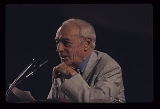
-born Jewish American writer
. For his literary contributions, Bellow was awarded the Pulitzer Prize
, the Nobel Prize for Literature
, and the National Medal of Arts
. He is the only writer to have won the National Book Award
three times, and the only writer to have been nominated for it six times.
In the words of the Swedish Nobel Committee
, his writing exhibited "the mixture of rich picaresque novel and subtle analysis of our culture, of entertaining adventure, drastic and tragic episodes in quick succession interspersed with philosophic conversation, all developed by a commentator with a witty tongue and penetrating insight into the outer and inner complications that drive us to act, or prevent us from acting, and that can be called the dilemma of our age." His best-known works include The Adventures of Augie March
, Henderson the Rain King
, Herzog
, Mr. Sammler's Planet
, Seize the Day, Humboldt's Gift
and Ravelstein
.
There is only one way to defeat the enemy, and that is to write as well as one can. The best argument is an undeniably good book.![]()
All human accomplishment has the same origin, identically. Imagination is a force of nature. Is this not enough to make a person full of ecstasy? Imagination, imagination, imagination. It converts to actual. It sustains, it alters, it redeems!![]()
We are all such accidents. We do not make up history and culture. We simply appear, not by our own choice. We make what we can of our condition with the means available. We must accept the mixture as we find it — the impurity of it, the tragedy of it, the hope of it.![]()
We mustn't forget how quickly the visions of genius become the canned goods of intellectuals.![]()
I think that New York is not the cultural center of America, but the business and administrative center of American culture.![]()
Everybody needs his memories. They keep the wolf of insignificance from the door.![]()
Once you had read the Sigmund Freud|Psychopathology of Everyday Life, you knew that everyday life was psychopathology.![]()
I never yet touched a fig leaf that didn't turn into a price tag.![]()
No realistic, sane person goes around Chicago without protection.![]()

